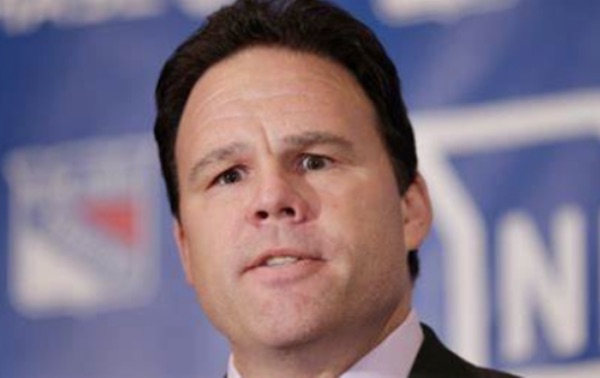Also Interesting
Montreal Canadiens: Gorton’s Reported Contract Length, Roy Interested In GM Role

Jeff Gorton’s Contract Reportedly For Five Years
Montreal Canadiens owner Geoff Molson made sweeping changes amid an extremely frustrating season over the weekend, bringing in Jeff Gorton to serve as the executive vice
president of hockey operations after firing GM Marc Bergevin. Longtime assistant GM Trevor Timmins and senior VP of public affairs and communications Paul Wilson were also let go by Molson.
In his latest 32 Thoughts column, Sportsnet’s Elliotte Friedman reported that Gorton’s deal “is believed to be a five-year contract”. Gorton was general manager of the New York Rangers from 2015 to 2021. James Dolan’s decision to fire Gorton was largely surprising as the latter did an excellent job in steering the team’s rebuild.
Gorton, renowned for his scouting and drafting talents, built a Rangers team that has surpassed expectations in the early going (13-4-3 entering December). He’s now tasked with fixing up a struggling 6-16-2 team that fell to the Tampa Bay Lightning in the Stanley Cup Final just five months ago.
With the season slipping away rapidly, the Canadiens share the second-lowest Stanley Cup odds in Ontario online sports betting with the Ottawa Senators and Vancouver Canucks.
Patrick Roy Interested Habs’ GM Position
To say that the Canadiens franchise hasn’t been the same since the ill-fated Patrick Roy trade in 1995 would be a massive understatement. In a way, it would only be fitting if Roy returned to save the franchise that last won the Stanley Cup in 1993 — when he was the man between the pipes.
Speaking to Le Journal de Québec, Roy talked about his interest in taking over the Canadiens’ vacant general manager position. Roy asked what the Habs “have to lose by giving me the chance to see what I can do with this club?” The Hockey Hall of Famer admitted, however, that he may “not be the guy for” Molson.
Roy coached the Colorado Avalanche from 2013-14 to 2015-16, before stepping down after three seasons. The four-time Stanley Cup champion emphasized that his lack of input on team personnel decisions factored in the decision to resign.
Molson announced that the hockey operations will be led by two people going forward, Gorton and the new GM. There is no timeline yet on when the Canadiens may announce their GM.
Max Pacioretty: ‘Everybody Has A Shelf Life’ In Montreal

Vegas Golden Knights star forward and former Canadiens captain Max Pacioretty — who spent his first 10 NHL seasons with Montreal — looked back on his time with the franchise during an appearance on the “Agent Provocateur” podcast (h/t Brandon Maron of theScore). “Montreal is an amazing place, and I’m so proud of what I accomplished there, but I just feel like everybody has a shelf life there,” Pacioretty said. “Everyone told me it – ex-players, current players, fans.”
The 33-year-old also admitted that the pressure of playing in Montreal can become overwhelming, and that he doesn’t feel it as much in Sin City. “There just seems to be so much less pressure, and whether you admit it or not, you just go about your everyday life in such an easier manner that it really (takes) so much less of a toll on you,” Pacioretty said. “Whether you’re a leader or a young guy, there’s no media here. Even if you don’t read the media in Montreal, you know what’s being said.”
Pacioretty was traded to the Golden Knights in a 2018 blockbuster as the Habs began a minor rebuilding phase. Needless to say, the trade has done wonders for both teams.
Montreal received forwards Tomas Tatar and Nick Suzuki plus a 2019-second round pick. Tatar crossed the 20-goal and 50-point marks twice as a Hab, and Suzuki has notched back-to-back 41-point seasons. Suzuki turned his game up in the 2021 postseason, notching seven goals and 16 assists in 22 games. Pacioretty has hit the 20-goal mark in each of his first three seasons with Vegas, leading them to the Conference Finals in 2020 and 2021.
In his 10 seasons with the Canadiens, Pacioretty scored 226 goals and 448 points in 626 games. He led Montreal to the Eastern Conference Final in 2014 (where they fell to the New York Rangers) and guided the franchise to division titles in the 2012-13, 2014-15 and 2016-17 seasons.
Also Interesting
Tips to build an income stream through betting

Financial freedom means different things to different people. Some seek to clear debt or reduce working hours. Others aim to build an income stream separate from traditional employment. Betting is often seen as entertainment, but some treat it as a potential method for financial gain.
It is not a simple route. Success in betting depends on skill, patience, and clear risk control. Casual bets and chasing losses are not the same as long-term planning. Play slots and live casino online deals may attract interest, but true gains require a well-developed approach grounded in calculation,
not luck.
Some treat betting as a serious income project. Like investing, it involves monitoring markets, sticking to rules, and managing emotion. These habits shape outcomes more than any single win or loss.
The Role of Strategy and Market Choice
Building consistent returns from betting starts with discipline. Most success stories come from people who specialize in specific markets. They avoid randomness and focus on repeatable patterns. This reduces risk and allows room for structured decisions.
For some, sports betting offers the best value. Others prefer slots, roulette, or blackjack. Success in each area depends on the ability to control the betting environment. Choosing fixed budgets, setting limits, and logging results all contribute to a more sustainable system.
In Ireland and the UK, platforms now offer a wider range of services. These include analytics tools, stat-based bets, and account dashboards. Markets like Slots and table games in Ireland are especially popular among users who combine short sessions with targeted goals.
Key traits of long-term betting approaches include:
● Specialising in specific games or sports.
● Avoiding emotional or rushed bets.
● Logging every session and reviewing performance.
● Staking only a fixed portion of the bankroll per event.
Psychological Factors and Risk Limits
Financial growth through betting requires mental control. Most losses in gambling happen when people act without a plan. Emotional decisions, such as doubling stakes after a loss, often lead to poor outcomes.
Structured bettors approach the activity with neutral judgement. They view each bet as part of a larger system, not an isolated moment. This approach reduces stress and protects capital. Understanding the limits of control also helps. For example, not every market behaves the same
way each week.
Many betting platforms now offer tools that assist with self-monitoring. These include loss caps, spending summaries, and trend reports. These systems support the user but cannot replace careful thinking. Understanding the connection between strategy risk and decision making can lead to
better choices, both short and long-term.
Economic Context and the Role of Discipline
The idea of using betting as a route to financial freedom often attracts attention during economic stress. Some people look for faster income options when prices rise or wages stagnate. However, betting is not a guaranteed path. It only works when treated as a skill-based discipline, not a
shortcut.
Those who see results often treat betting like a second job. They put in regular hours for research, review performance metrics, and stick to a strict process. This removes guesswork and replaces it with control.
Having multiple sources of income is one part of building financial freedom. Betting can be one of those if it is paired with discipline, patience, and analysis. It is not passive income. It requires consistent effort and awareness.
Sensible Goals and Sustainable Progress
Success with betting should not be measured in jackpots or sudden windfalls. Small, repeatable profits are more stable. The aim is to grow a bankroll slowly, avoid major losses, and learn from every result. This mindset supports steady progress and avoids burnout.
Financial freedom through betting is possible for some. However, it depends on the user, not the platform. Planning, structure, and clear risk boundaries matter more than the type of bet. For those who view betting as a long-term activity rather than a quick fix, it can play a role in building
independence.
As always, betting should be treated with care and clear intent. When combined with focus and habit, it can support a wider plan toward financial freedom. However, without those foundations, it is more likely to create setbacks than solutions.
Also Interesting
Dodgers Hitting Their Stride: Winning Streak Sets Stage for Key Matchups

The Dodgers are on a roll, with nine consecutive victories against the Colorado Rockies and nine out of the last 11 overall. Max Muncy hit a grand slam and drove in six, and Yoshinobu Yamamoto pitched five scoreless innings, giving up only one hit and striking out six to go to 7-6 on the season in the finale on June 26 in Denver. More recently, in the season opener (June 25), the game was a 97 slugfest where Ohtani, Conforto, and Teoscar Hernandez, among others, put their stamp on the scoreboard, with the Dodgers taking home the game thanks to Colorado giving them the opportunity to win it late.
Top Players: Muncy/Ohtani Setting the Pace
Max Muncy has been feisty with the bat, hitting his twelfth homer of the season, his second grand slam in only three contests. Shohei Ohtani keeps producing at the plate and the mound with key home runs and a three-run triple as part of a 13-7 triumph over Washington last week, though he pitched a scoreless inning in his post-surgery outing. Teoscar Hernandez and Michael Conforto have also provided power and reliability, and provided the Dodgers with a strong offensive weapon range.
Squad Depth
The rotation has been boosted by Yoshinobu Yamamoto being the team’s ace, leading the team in April with a 1.06 ERA and still good towards the end of June, most recently against Colorado. The club has an extremely solid starting staff when healthy, with Blake Snell and Tyler Glasnow added to the mix in the offseason. Teoscar Hernandez has contributed clutch offense in the lineup during spring and early regular season after signing a three-year extension before the season began.
Looking at it through betting glasses, having both spectacular pitching and a potent offensive battery makes the Dodgers a heavy moneyline favorite and a good run line bet, particularly against inferior teams. Betting enthusiasts who want to compare the odds and get the maximum return on the Dodgers will find useful websites such as Wincomparator, a solid link to sportsbooks promotions, and a useful tool with real-time updates so that they can stay ahead of the odds.
What Next: Preview of Forthcoming Matchups
After sweeping Colorado, Los Angeles plans on concentrating on future matches at home. They have some prime match-ups with divisional rivals such as the Diamondbacks and Padres (who will provide the most difficult stretch of games in the NL West) as the season progresses. One of the most intriguing games will involve the Dodgers making a second visit to Arizona, a team that has a strong offense, including Cy Young winner Corbin Burnes.
In the meantime, recent Yankees-Dodgers previews indicated that New York would challenge L.A. with its depth as the Yankees were leading MLB in many offensive categories, and with games approaching in later summer, Dodgers fans will hope that Betts, Freeman, and Ohtani will be able to handle it in key moments in June or July.
Outlook: Second Half Positioning
As July approaches, the Dodgers appear to be in shape to continue dominating the NL West. They possess a talented pitching staff, a powerful offense that will depend on depth, and the ability to withstand injuries, which places them within the upper tier of projections, with pundits expecting them to prevail in futures markets towards another deep playoff run. So long as they remain healthy, continue to deliver in crunch time, Los Angeles is a solid step away in the season stretch run.
-

 COVID-199 hours ago
COVID-199 hours agoOntario man launches new challenge against province’s latest attempt to ban free expression on roadside billboards
-

 Energy17 hours ago
Energy17 hours agoThis Canada Day, Celebrate Energy Renewal
-

 Business1 day ago
Business1 day agoWhile China Hacks Canada, B.C. Sends Them a Billion-Dollar Ship Building Contract
-

 Alberta1 day ago
Alberta1 day agoSo Alberta, what’s next?
-

 Alberta8 hours ago
Alberta8 hours agoAlberta Next Takes A Look At Alberta Provincial Police Force
-

 Bjorn Lomborg1 day ago
Bjorn Lomborg1 day agoThe Physics Behind The Spanish Blackout
-

 Alberta10 hours ago
Alberta10 hours agoCanadian Oil Sands Production Expected to Reach All-time Highs this Year Despite Lower Oil Prices
-

 Business12 hours ago
Business12 hours agoPotential For Abuse Embedded In Bill C-5





